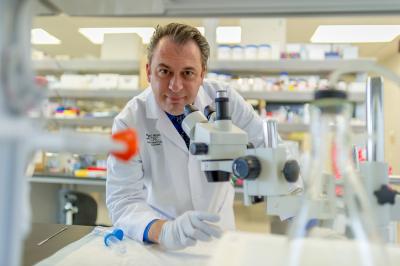Aspirin may slow recurrence in breast cancer patients

Research by Andrew Brenner, M.D., Ph.D., oncologist at the Cancer Therapy & Research Center at The University of Texas Health Science Center at San Antonio, reveals some postmenopausal overweight breast cancer patients who use common anti-inflammatory drugs have significantly lower breast cancer recurrence rates. Credit: Cancer Therapy & Research Center
New findings published today in the journal Cancer Research reveal that some postmenopausal overweight breast cancer patients who use common anti-inflammatory drugs like aspirin or ibuprofen have significantly lower breast cancer recurrence rates.
Researchers from the Cancer Therapy & Research Center at The University of Texas Health Science Center at San Antonio and the University of Texas at Austin began by examining blood serum from CTRC breast cancer patients, said CTRC oncologist Andrew Brenner, M.D., Ph.D.
Studying Blood Serum
They placed the serum in a culture of fat cells that make estrogen, and then placed the serum on breast cancer cells. The serum from overweight and obese patients caused the cancer cells to grow much more aggressively than the serum from patients who were not overweight.
“It looks like the mechanism is prostaglandins, which have a role in inflammation, and there's more of it in the obese patient serum,” Dr. Brenner said.
Based on those findings, the researchers did a retrospective study on patients from the CTRC and the START Center for Cancer Care. They were segregated into those taking COX2 inhibitors (aspirin or ibuprofen) and those who did not.
Finding a Lower Recurrence Rate
“Patients who were on COX2 inhibitors tended to have a lower recurrence rate,” Dr. Brenner said.
Anti-inflammatory use reduced the recurrence rate of ERα positive breast cancer by 50 percent and extended patients' disease-free period by more than two years. ER positive breast cancers, cancers that grow in response to exposure to the hormone estrogen, are among the most common form of the disease, accounting for approximately 75 percent of diagnoses.
Cancer researcher Linda deGraffenried, Ph.D., from The University of Texas at Austin, designed the study, working closely with Dr. Brenner and Murali Beeram, M.D., a cancer specialist from the START Center.
The investigators caution that these results are preliminary.
“Overweight or obese women diagnosed with breast cancer are facing a worse prognosis than normal-weight women,” said Dr. deGraffenried, who is also adjunct assistant professor in the Department of Cellular and Structural Biology at the Health Science Center.
Facing a Different Disease
“We believe that obese women are facing a different disease. There are changes at the molecular level. We want to reduce the disease-promoting effects of obesity.” Based on those results, the CTRC has launched a pilot anti-inflammatory trial in a joint venture with UT Austin, and the research partners are seeking funding for a larger study.
“We would like to identify which women are most likely to benefit from interventions like adding NSAIDs to treatment regimens,” Dr. deGraffenried said.
The study published in Cancer Research was funded by the United States Department of Defense, Breast Cancer Research Program (W81XWH-11-1-0132) and by the National Cancer Institute (CA054174).
For current news from the UT Health Science Center, please visit our news release website or follow us on Twitter @uthscsa and Facebook.
The Cancer Therapy & Research Center (CTRC) at The University of Texas Health Science Center at San Antonio is one of the elite academic cancer centers in the country to be named a National Cancer Institute (NCI) Designated Cancer Center, and is one of only four in Texas. A leader in developing new drugs to treat cancer, the CTRC Institute for Drug Development (IDD) conducts one of the largest oncology Phase I clinical drug programs in the world, and participates in development of cancer drugs approved by the U.S. Food & Drug Administration. For more information, visit http://www.ctrc.net.
Media Contact
All latest news from the category: Health and Medicine
This subject area encompasses research and studies in the field of human medicine.
Among the wide-ranging list of topics covered here are anesthesiology, anatomy, surgery, human genetics, hygiene and environmental medicine, internal medicine, neurology, pharmacology, physiology, urology and dental medicine.
Newest articles

Superradiant atoms could push the boundaries of how precisely time can be measured
Superradiant atoms can help us measure time more precisely than ever. In a new study, researchers from the University of Copenhagen present a new method for measuring the time interval,…

Ion thermoelectric conversion devices for near room temperature
The electrode sheet of the thermoelectric device consists of ionic hydrogel, which is sandwiched between the electrodes to form, and the Prussian blue on the electrode undergoes a redox reaction…

Zap Energy achieves 37-million-degree temperatures in a compact device
New publication reports record electron temperatures for a small-scale, sheared-flow-stabilized Z-pinch fusion device. In the nine decades since humans first produced fusion reactions, only a few fusion technologies have demonstrated…





















